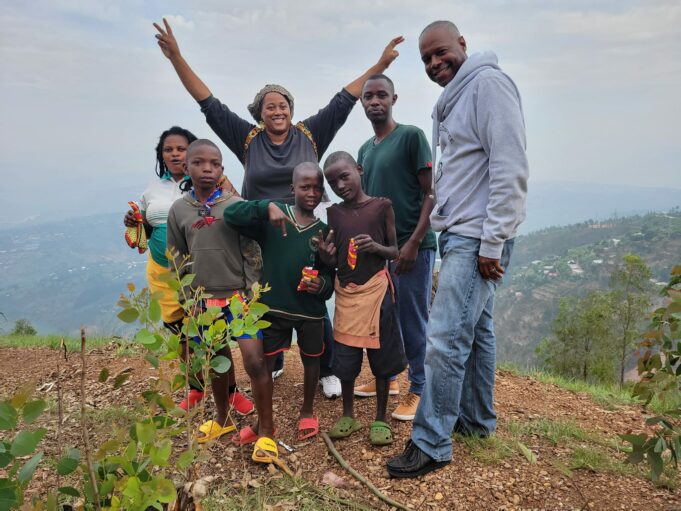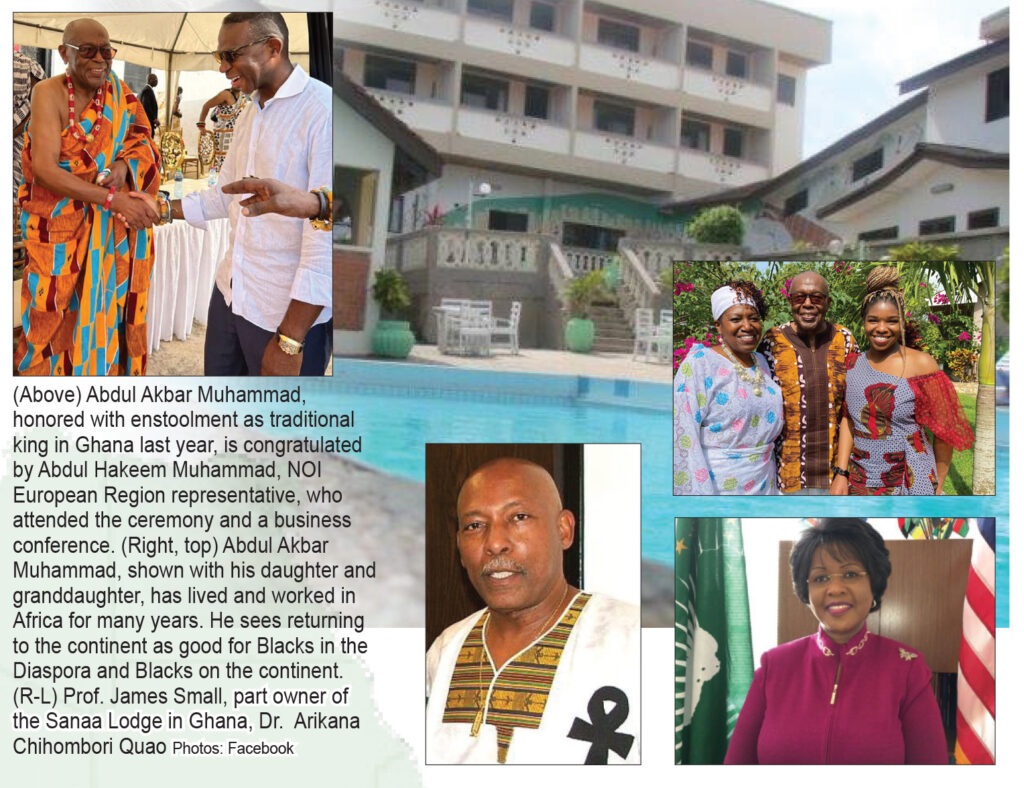Serious interest in going back to and engaging with Africa keeps growing among Blacks in the West separated from the continent for nearly 500 years.
After experiencing slavery, marginalization, racism, and seemingly unending discrimination, many are opting to create life elsewhere rather than continue “living while Black” in America and Europe.
They are enhancing their well being—spiritually, mentally, emotionally and economically.
For LaMont and Adilah Muhammad, who relocated to Rwanda in East Africa from Atlanta, Ga., increased police killings of Blacks and growing U.S. racial animus factored in leaving the United States.
“It began to take a great effect,” LaMont Muhammad told The Final Call in a telephone interview from Kigali, Rwanda’s capital. The Muhammads are members of the Nation of Islam and see their decision as an expansion.
“We’re taught through the teachings, we’re the Original People, the whole earth belongs to us,” explained LaMont Muhammad. “We can move about and go wherever … explore … go and see what the other parts of the world have.”
Adilah Muhamad, a professional chef, owned a thriving catering business in Atlanta. Her business was hurt by the Covid-19 pandemic. The couple wanted to open a café and dining establishment but it was difficult because of capital issues and red tape in Atlanta.
After researching Africa and scouting Ghana, Senegal, and Tanzania, they settled on Rwanda, which they found the most business friendly. So far, they have opened an Airbnb and a café.
Through the Ikawa Café & Bistro, the couple is living their dream. The business is located in Remera, a city just east of Kigali and the staff is all Rwandan. It’s a space that fuses cultures and experiences where American expats can come together with Rwandans.
“What we’re able to do here, we would not have been able to do in the states,” said LaMont Muhammad.
The commitment to live, invest, and reconnect to Africa is an affirmation that her sons and daughters are returning to build a new future of peace and prosperity.
For some, planning, engaging repatriation, and exploring the possibilities are key. And, they see Black self-determination as the only way out of a continuous negative circumstance in the West.
“We are the generation that has been tasked to break the cycle of poverty and want and dependency upon our former enslaver and colonial masters,” said Abdul Hakeem Muhammad, the European Regional Representative of the Nation of Islam based in London. He is working with a group seeking business and other opportunity in Africa—and the Caribbean.
“We are responsible to break these generational curses of dependency,” added Min. Hakeem Muhammad.
Millions of Africans were shipped as human cargo from the Motherland in the holds of ships during the Trans-Atlantic Slave Trade. Europeans who commissioned the inhumane commerce never intended nor expected the victims to return.
This wave of Blacks leaving their former places of bondage in the West is part of a history of repatriation at different times over the last two centuries.
“So many Africans in the Diaspora are serious about this and want to get involved in relocating,” said Abdul Akbar Muhammad, the international representative of the Nation of Islam and the Honorable Minister Louis Farrakhan. He lived in Ghana for many years, opening a center for the Nation of Islam, building relationships and running a travel agency.
“This is an opportunity for the vision of the Honorable Elijah Muhammad on separation to come into reality,” explained Min. Akbar Muhammad. Circumstances in the world necessitate serious consideration of separation, he continued.
Thousands of Blacks returned to Africa in the 1800s and subsequently established the nation of Liberia. Although the move was not struggle free, it was fraught with possibility.
Blacks in the West are in virtually every field, every profession and hold every skill as their White counterparts. Min. Akbar Muhammad sees repatriation as a win-win for continental Africans and those returning.
“We are your brothers trying to find a way to use what we have learned under the terrible bondage of slavery to help develop Mother Africa,” he said.
Building relationships, bridges of unity and facilitating the ties between continental Africans and the growing numbers of Black people desiring to return is necessary.
Organizations like the African Diaspora Development Institute (ADDI) were born out of the need to bring “Africa to the world and the world to Africa.”
Last December, at a major conference and trade expo, ADDI launched the “Wakanda One-City of Return” initiative in Ghana where 5,000 acres of land was granted for development by the government. ADDI is focused on facilitating the substantive return of the sons and daughters of Africa.
“Africans in the Diaspora were not engaging the continent to the extent that we should simply because we were misinformed. Now Black people are flocking to Africa in droves,” said Dr. Arikana Chihombori Quao, founder and president of ADDI. She is also a former African Union ambassador who worked on building support for Africa in the Diaspora. She is outspoken and fierce in her position in Black empowerment and unity.
In a video presentation on the ADDI webpage, Ms. Chihombori-Quao said the Diaspora-Motherland connection must be realized because the world still looks to Africa for its needs.
Black people must rescue “our Africa” from those who have exploited it for centuries, she declared.
“While we welcome direct foreign investment … Black people, the Africans, must be on the driver’s seat when it comes to the continental development agenda for Africa,” argued Ms. Chiombori-Quao.
“This is a high point or what you might call a wave,” commented James Small, former professor of Black Studies at City College in New York.
Professor Small pointed out that in 2019 the government of Ghana in West Africa initiated the “Year of Return” recognizing the 400-year mark of 1619 and the Trans-Atlantic Slave Trade. Events drew thousands of people to Ghana–mostly Black Americans—in 2019 and was credited with attracting more interest to the country and continent.
“What they did not say … there were already 8,000 plus African Americans living in Ghana already,” Dr. Small told The Final Call. The scholar and activist has engaged Africa for decades. And for 16 years, with others, has owned the Sanaa Lodge Hotel in Cape Coast, Ghana.
Black Americans have been living in Africa for many years and for different reasons, including countries like Tanzania, where exiled activists in the 1960s and 1970s Black liberation struggle found a safe haven.
Kojo Yankah, founder of the Pan African Heritage Museum in Ghana, said interest was also rooted in the early years of African independence coming out of the colonial era.
During Ghana’s 1957 independence, Dr. Kwame Nkrumah, its first president invited a delegation from America that included Rev. Martin Luther King, UN Under-Secretary General Ralph Bunche, and others. When Dr. King returned to America, he encouraged Black American professionals to go and support Dr. Nkrumah and Ghana’s development.
“That was significant because soon after that we had some doctors, dentists, engineers coming to Ghana,” said Mr. Yankah. “This was in addition to what Dr. Nkrumah himself did to invite George Padmore, W.E.B. DuBois and others to come and help in his government.” President Nkrumah was educated at Lincoln University in Pennsylvania, an historically Black college.
Such repatriation continued until the 1966 CIA orchestrated overthrow of Dr. Nkrumah. In the decades that followed, incremental movement back to Africa resumed in countries like Uganda and South Africa.
Besides Dr. DuBois, figures like Alice Windom, Mayo Angelou and currently Rita Marley and Stevie Wonder are examples of Blacks opting for Africa.
Although Africa has its share of challenges, “none of that really comes up to the level of living in fear all the time and anxiety due to racism and abuse,” said Mr. Small.
Whatever negative one encounters in Africa, conversely you find “a reception,” “a love,” a “warmth and affection,” not experienced living in White-dominated America, he added.
People are looking to be where they feel like human beings, and where fellow human beings are genuine.
“I may not make the kind of money I make in America, but I’ve got a peace of mind,” said Dr. Small. “It’s a different world.”














